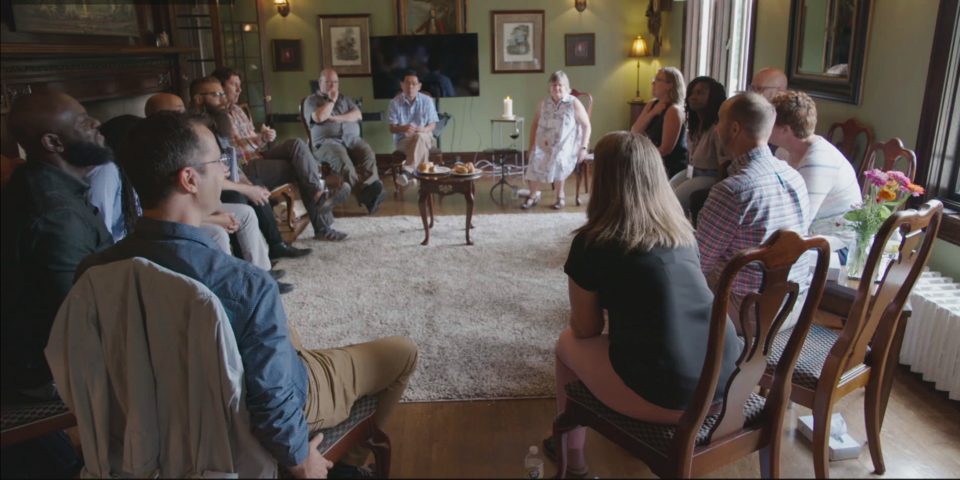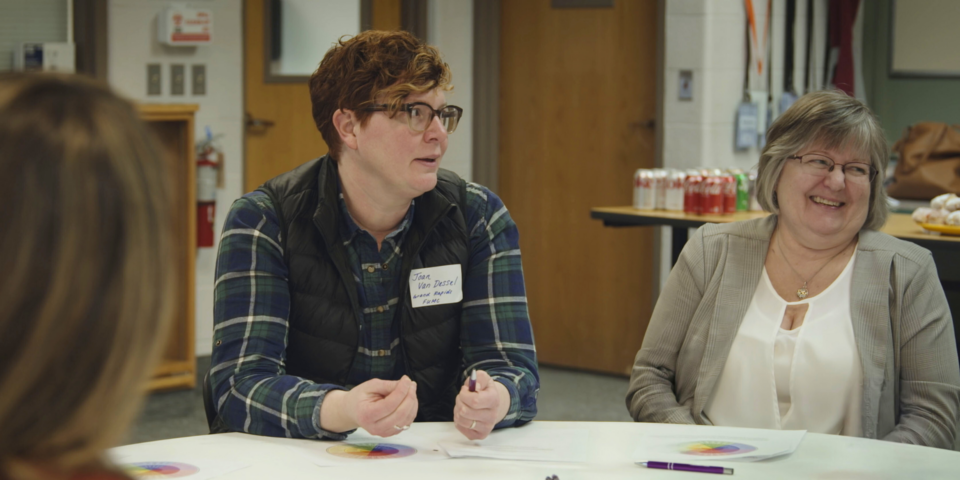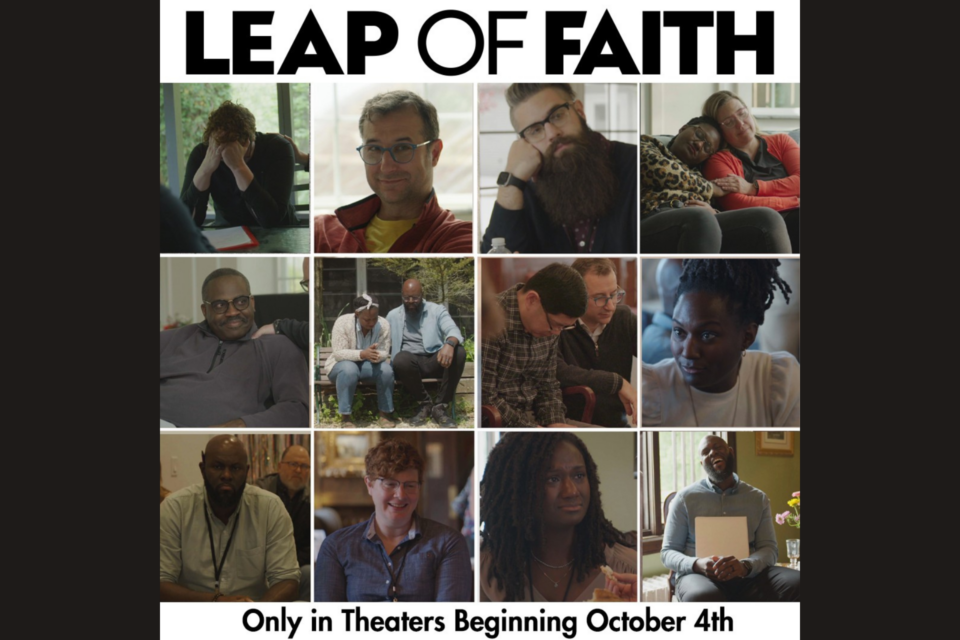Leap of Faith, a new documentary featuring two Michigan United Methodist pastors, explores how we can disagree and still belong to each other in a divided world.
JOHN E. HARNISH
Michigan Conference Communications
“In 2016, one in six people stopped talking to a family member. It’s even worse now. How do you continue to love each other while you disagree?”
That’s the lead-in for Picturehouse’s promo for Leap of Faith. This new documentary film tells the story of 12 diverse Christian leaders who came together with the desire to find hope and fellowship in a series of boundary-breaking retreats in Grand Rapids, Michigan.
Two Michigan United Methodist clergy were involved in the project. At the time of the filming, Rev. Kim DeLong was the pastor of Wyoming Park UMC, and Rev. Joan VanDessel was the associate pastor at Grand Rapids: First UMC. The diverse group of twelve included five African Americans, one Chinese American, and five women, representing the theological spectrum of faith communities in the greater Grand Rapids area, from very conservative to liberal progressive.
As these leaders discussed and faced difficult issues, the divisions between them tested both their common belief in the importance of love and the bonds they built during three week-long retreats over two years.
The documentary, directed by Nicholas Ma, son of renowned cellist Yo-Yo Ma, will be released in select theaters on October 4, 2024. Picturehouse has acquired the distribution rights and plans for a nationwide release. Sign up on Leap of Faith’s website to be notified when the film will be shown in your area.
Leap of Faith was the brainchild of Rev. Michael Gulker of The Colossian Forum. This Grand Rapids-based nonprofit aids Christians with conflict transformation. Driven by the biblical promise of Colossians 1:17, that “all things hold together in Christ,” they work closely with leaders in churches, schools, nonprofits, and small groups to promote the health and sustainability of the church in the face of intensifying polarization and division.
“I think,” said Joan, “we were trying to reimagine how the church can draw people together toward a common center, but we ended up finding belonging amongst one another without moving away from our political positions or theological convictions. We discovered ways to love each other across those differences. We also discovered that that work is a lot harder — and a lot more holy — than you would have ever imagined.”
Grand Rapids is considered a politically divided “purple city,” and one of the project’s initial goals was to see how these religious leaders could model conflict transformation and lead the city forward. Project leaders felt that if these twelve leaders could unite across denominational differences and find space for one another, the city could heal and change.

As difficult as the work was, the group of pastors found a sense of genuine care for each other across their theological and social divisions. “In the end,” Kim said, “it might not have changed Grand Rapids, but it changed us. We moved from the left and the right and tried to discover a center as a place of possibility and a place of hope.”
As the only openly gay pastor in the group, VanDessel said, “Some of the participants didn’t know what to do with me.” However, both Kim and Joan felt that, in some ways, LGBTQIA+ concerns were easier to talk about than racism and class. “To focus on such issues,” Kim said, “people need to be vulnerable and culpable concerning their own involvement, and that is very hard to do.”
When asked if they thought the film project achieved its purpose, Kim said, “It succeeded in that we learned building community is a process, not an end goal. It’s not something achieved but an ongoing relationship creating an opportunity for growth.” As she looked back on the diverse group, Joan discovered, “I wouldn’t want a church without any of these people, even the most staunchly conservative, because in that space, we found a way to love each other, really love each other.” She confessed, “It was hard and sometimes hurtful, but it was beautiful.”
Inspiring and provocative, Leap of Faith explores whether we can disagree and still belong to each other in a divided world. For a day when our nation seems so sharply divided, the film has a message we need to hear.

Yo-Yo commented on how his son’s creative work impacted him, “Leap of Faith moved me to take my own leap, to dive into the difficult conversations that will begin to heal the fractures in our communities, to ask how can I better practice that most fundamental call: love thy neighbor.” As Kim reflected on the experience and the documentary, she felt, “It’s hard to condense two years of week-long retreats into 90 minutes, but Nicholas has caught the group’s spirit and created a beautiful film.”
Perhaps the most significant message for the church came from a meeting between the pastors and the mayor of Grand Rapids, Rosalynn Bliss. When the group asked Mayor Bliss to name the most critical issue facing the city and how churches could help, they expected her to mention a pressing issue like affordable housing or gun violence. Instead, she said it was loneliness. Mayor Bliss believed that the lack of relationships was the root of many of the city’s problems and told the church leaders, “Go and do what you are supposed to do.”
If the church can do that — build the body of Christ and model a community of love and grace — perhaps it can help fulfill the initial purpose of the film project, which was to transform the city of Grand Rapids. This is not unlike the mission of The United Methodist Church, which is to “make disciples of Jesus Christ for the transformation of the world.”
To learn more about Leap of Faith, visit the film’s website at www.leapoffaithmovie.com.
Last Updated on September 23, 2024


